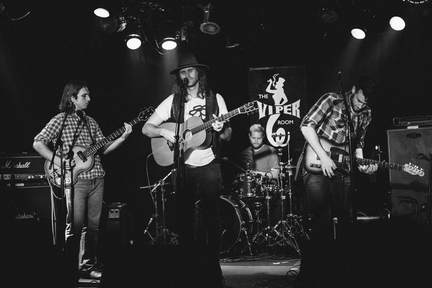 Courtesy: Tyler Miles Photo Courtesy: Tyler Miles Photo
Born and raised in the San Fernando Valley, Taylor Hungerford's family relocated to Chatsworth, a small equestrian town on the outer rim of the valley when he was a boy. There, he found a kindred spirit in Wolf Kroeger (bass) who shared a love of the frontier and open land that would shape and guide the gritty, desert inspired sound on their latest, Indian Summer. Here, Hungerford answers his Essential 8 where he shares the story behind Indian Summer, talks songwriting, bucket list items (Europe, the Opry), and more.
Is there a story behind your album’s title? As you know, an “Indian Summer” is a summer that lasts for longer than it should. For me, at least, it became a metaphor for the extended childhood I experienced living in my childhood home for so many years. It was a sweet deal - I had bandmates there, lots of parties and it was close to a lot of great western history. The album, by incidence, became a sort of story around that time. The album title also served the production, which gave the album a sort of Native American sound. Why did you choose to anchor the album with the songs you did? I wanted the album to be a journey that was uniform. I came to my producer Wolf Kroeger with a bunch of songs and we kind of chose the best ones out of the lot. I was also workshopping songs at a big open mic at The Lost Knight pub, so in the process of recording we also added new songs that we thought fit together with the others. I wanted to tell a story of the end of innocence and chose songs based around that. Where do you draw inspiration from when writing? I think that really depends on the song in question. For some songs, it might be an idea, like returning to nostalgia, others it might be a story that I feel the song is trying to say. For example, on the track Rumor, it begins with just two notes alternating. It started to paint a picture for me of two people running, and the story sort of flowed out from there. More generally, the character of the west - the romanticism of open of land as well as the desert.
Do you write about personal experience, the experience of others, observations, made-up stories, something else or a combination?
It will in all honesty be a bit of both. I think personal experiences come through incidence, as I will always express what it is that I’m feeling. At other times, it comes through in a story I want to tell. On the album, all the songs are connected through narrative, and the narrative comes from many different places. Some are first person (like August), others it’s a third party talking about two people (The Lovin’ Kind), others it’s just a force - celestial or otherwise (This Machine, Lost). Is there a professional “bucket list” item you would love to check off? Oh yes. The first would probably be touring Europe. I’ve never been there before and to go with my songs in front of a bunch of folks who don’t speak my native tongue would be greatly exciting. The second would be to play the Grand Ole Opry in Nashville. You’re sorta codified into country music after playing that place. What has been your biggest success so far? Opening up for the band Edison at The Whisky A Go Go. I was really able to create a buzz for that show (riding on the fact that one of the members used to be in The Lumineers). It was also a great crowd - many people showed up to support. What’s the best advice you have ever gotten from another musician? It wasn’t directly from said musician, but, I was watching Aaron Lee Tasjan at Hardly Strictly Bluegrass and he said that you’re never trying be better than anyone else, just try to be the best version of yourself. I think there’s a lot of weight to that, as so many artists get caught up in trying to be “the best.” In truth, there will always be someone who can outplay you, out-sing you and out perform you. The thing that will make you stand out is if you just say fuck it to all that and work on you as best you can. What’s the best advice to give to a musician just starting out? Whatever city you’re in, be part of the music community. Go to open mics, meet people, get out there, perform. Through it all, don’t commit to the truths others are trying to tell, but the one that speaks the strongest to you. Ask what it is you’re trying to say as an artist. Also ask if it’s something that needs to be said. The beginning is the period when you’re really going to ask yourself if you want to do music. If the answer to that question is a resounding “yes,” nothing will be able to stop you. Live, Hungerford and Kroeger are joined by composer Ryan Fultz on percussion and composer Michael Ward on guitar and backing vocals. Website/Facebook/Twitter/Insta
0 Comments
Leave a Reply. |
Archives
February 2019
|